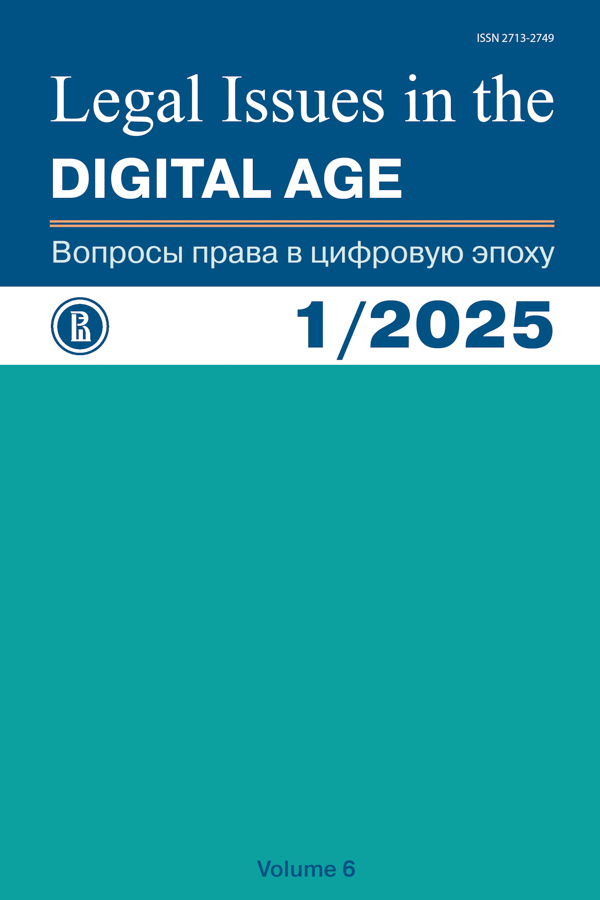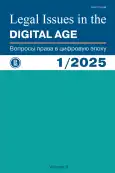Legal Issues in the digital Age
«Legal Issues in the Digital Age» is one of the leading peer-reviewed legal Journals. It is included in the list of leading Russian peer-reviewed scientific Journals and publications recommended by the Higher Attestation Commission of the Ministry of Education and Science of Russia for the publication of the main scientific results of dissertations for the degree of Doctor and Candidate of Sciences in the field of "Jurisprudence".
The Journal is published quarterly and was established as an electronic print organ of the National Research University Higher School of Economics.
At present, in connection with the development of the information society and the formation of the digital economy, the law is undergoing a number of changes: new institutions and industries are being formed, the legislator is introducing new legal terms. Theoretical problems also arise about the prospects of rights as a social regulator in the context of the development of information and communication technologies. The processes taking place are typical for countries with different legal traditions, but their manifestation in national jurisdictions differs.
It is the comparison of these processes that is the purpose of the Journal "Legal Issues in the Digital Age" and distinguishes it from other periodicals, mainly focused on the problems of information technology law and information security.
The Journal is intended for university professors, graduate students, researchers, the expert community, practicing lawyers, as well as for a wide range of readers interested in modern law and its interaction with the economy.
Media registration certificate: ЭЛ № ФС 77 - 83367 от 03.06.2022
ISSN (online): 2713-2749
Founder: National Research University Higher School of Economics
Editor-in-Chief: Irina Jur'evna Bogdanovskaya, Doctor of Sc., Associate Professor
Frequency / Access: 4 issues per year / Open
Included in: Higher Attestation Commission List, RISC
Current Issue
Vol 6, No 1 (2025)
Artificial Intelligence and law
A Comparative Perspective on the Future of Law in a Time of Artificial Intelligence
Abstract
The article explores the impact of AI on legal systems globally. It highlights how technology, particularly AI, disrupts social order and power dynamics, necessitating legal adaptations. The document categorizes global AI regulatory responses into four types: no response, reliance on existing tech regulations, fragmented solutions, and unified approaches. The European Union (EU) has adopted a unified approach with the Artificial Intelligence Act (AIA), aiming to harmonize AI rules, address risks, and stimulate AI development. The United States employs a piecemeal approach with the National Artificial Intelligence Act of 2020 and various state laws and executive orders. Australia lacks specific AI legislation, but it has an AI Action Plan focusing on economic benefits and talent development. South Africa’s National AI Policy Framework emphasizes economic transformation and social equity. The African Union’s Continental AI Strategy aims for socio-economic transformation while addressing AI risks. Canada has a Voluntary Code of Conduct and a proposed Artificial Intelligence and Data Act (AIDA). The document critiques current AI regulations for incomplete definitions and a lack of focus on the broader societal purpose of AI. It stresses the need for regulations to consider ethical dimensions and societal impacts. The document concludes that AI regulation must balance innovation with social order, human dignity, and safety, emphasizing the urgent need to address AI’s energy and water consumption to prevent potential global instability.
 4-27
4-27


Model Regulation of Artificial Intelligence and other Advanced Technologies
Abstract
The article provides a discussion of legal regulation of social relations by the Interparliamentary Assembly of the CIS Member States with regard to AI and other advanced information technologies, identifiable regulatory gaps, conceptual framework, analysis of possible use scenarios and related risks, as well as the range of problems to be addressed by regulation on a priority basis. It contains a brief overview of how AI-related social relations are regulated in the CIS member states. While all these countries admit the importance of such regulation, none has developed a clear understanding of a number of issues, only to stress the relevance of developing a draft model law on AI technologies. The authors demonstrate the following common problems of regulating these relations in the CIS member states: identifying the regulatory scope and the parties concerned and, importantly, addressing the issues of liability including what party (AI technology rights holder, developer, system operator etc.) and in what case will assume a particular type of liability (administrative, civil, financial, criminal). Another important aspect is also discussed — digitization and advanced digital technologies shaping “new” digital personal rights — with an analysis and brief overview being provided. The study purports to identify the trend and opportunities for public regulation of AI and other advanced digital applications. With this in mind, the authors discuss possible regulatory vectors in the given area in light of the risks related to operational specifics of digital technologies, and identify groups of social relations to be adequately addressed by legal regulation. With digitization covering an ever wider range of social relations, the problems to be addressed by law include the protection of personal rights as well as prevention of non-discrimination of individuals and economic agents. The article employs a number of scientific methods of inquiry, general and special research methods including the formal law method. The general research methods include systemic, dialectic, structural systemic, analytical/synthetic, inductive and deductive methods, abstraction, simulation. The article concludes that, while the CIS countries are at different regulatory stages in the discussed area, there is no comprehensive regulation, with only individual provisions and regulations in place to govern specific aspects of AI use. A model law, once developed, will allow to lay the ground for comprehensive regulation of the discussed relations by the national legislation.
 28-52
28-52


Legal Evolution of Human Rights Protection in Uzbekistan Amid Digital Transformation
Abstract
The article is devoted to the development of legislation of Uzbekistan in the context of the transition to a digital economy. The article provides an overview of the norms introduced into the law taking into account the impact of digitalization on public relations. The author examines new provisions of the Constitution, codes, and other regulatory legal acts. Particular attention is paid to the review of concepts and strategies for the development of Uzbekistan until 2030 and their provisions regarding digital technologies. The author notes that the legislation of Uzbekistan is developing taking into account global trends, including such a factor as the intensive development of digital technologies. It is important to continue measures to improve legislation in the field of human rights taking into account the digitalization factor and to ensure reliable guarantees for the protection of human rights in the digital economy.
 53-82
53-82


The Application of Artificial Intelligence in China’s Criminal Justice System
Abstract
Influenced by the advanced technologies, in recent years, Chinese criminal justice system has begun integrating artificial intelligence (AI) to assist judicial decision-making. AI has entered into various areas such as criminal investigations, prosecution assistance, and sentencing support. However, Chinese legal system has not comprehensively addressed the regulation of judicial AI technology yet. This paper aims to explore the application of AI in Chinese criminal justice system and propose a systematic regulatory framework for its future development. Part I provides an overview of the specific application scenarios of AI in Chinese criminal justice system. Part II analyzes the general characteristics of judicial AI and the benefits it brings to the justice system. Part III examines the challenges limiting the further development of judicial AI and the potential risks associated with its application. Part IV proposes an inclusive regulatory framework to balance the intension and potential conflicts between judicial fairness and technological advancement. This research seeks to enhance the understanding of AI application in Chinese criminal justice system and to identify and prevent potential judicial risks arising from AI application.
 83-104
83-104


Copyright Law in the digital age
Digital Technologies and Forensic Examination of Copyright Works
Abstract
With the ability to enable remote trial sessions and promptly find and forward documents, digital technologies are increasingly used in judicial proceedings worldwide including Russia. However, in view of possible risks artificial intelligence is used at court only in the test mode, including for forensic examination of copyright works as a likely option. The article contains a discussion of the benefits and risks of AI when used for forensic examination. It is argued that AI can only serve as a tool for forensic examination, with shared approaches applicable to all copyright works to be developed and made available to judges, as well as expert opinion templates.
 105-123
105-123


Review
Artificial Intelligence and Law: From Theory to Practice
Abstract
On October 18, 2024 the XIII International Scientific and Practical Conference “Law in the Digital Age” was held at the Faculty of Law of the Higher School of Economics (HSE). This year it was devoted to the topic of artificial intelligence (AI) and law. It was considered from the standpoint of both private and public law. The conference covered the issues of the civil law regime of artificial intelligence technologies and objects created with its use, artificial intelligence and intellectual property law, as well as the topic of generative content and protection of the interests of copyright holders. The topic of regulation and self-regulation of artificial intelligence, including artificial intelligence in Legal Tech, is highlighted. Introduction of Artificial Intelligence Technologies in Labor Relations: Successes, Failures, Prospects Criminal Law Protection of Digital Economy and Finance Entities Using Elements of Artificial Intelligence. Thus, the conference attempted a comprehensive discussion of the role of law in the development of AI technologies. This approach made it possible to show the relationship between the methods of legal regulation in this area, their interaction to create conditions for the development of AI technologies. The conference raised both practical and theoretical issues of the development of law in the new conditions, as well as the problems of the development of legal education.
 124-148
124-148












